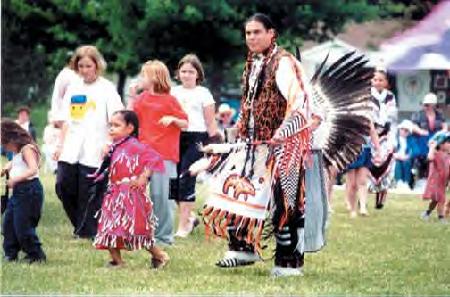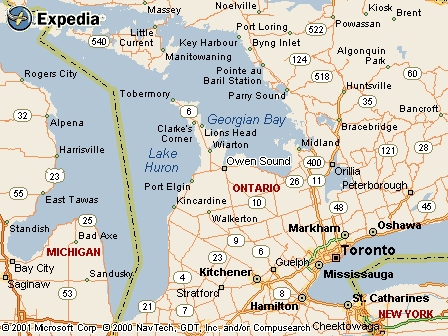|
|
Canku Ota |
|
|
(Many Paths) |
||
|
An Online Newsletter Celebrating Native America |
||
|
July 28, 2001 - Issue 41 |
||
|
|
||
|
Return of Drums Reunites Ojibwe |
||
|
by Roberta Avery Indian Country Today correspondent-July 11, 2001 |
||
|
Photo by Ted Shaw of Indian Country |
 OWEN SOUND,
Ontario - After 150 years of silence, the drums have returned to the site of a former Ojibwe village on the shores
of Owen Sound Bay, Lake Huron. OWEN SOUND,
Ontario - After 150 years of silence, the drums have returned to the site of a former Ojibwe village on the shores
of Owen Sound Bay, Lake Huron.At an emotional ceremony in June, the Return of the Drums traditional pow wow held, at the site of the original village, reunited the Ojibwe people now called the Chippewas of Nawash with the home of their ancestors for the first time since they were relocated in the 1850s. For the Chippewas of Nawash who now live on a small reserve on a rocky headland about 25 miles to the north, the pow wow was a reminder of the life their ancestors enjoyed in this beautiful location that is now a park in downtown Owen Sound, said Chief Ralph Akiwenzie. "I think history has borne out that there is continuity and the continuity is that these are our ancestral homelands. We're not very far from home, we're very close," he said. Leeann Eamer, executive director of the M'Wikwedong Native Centre in Owen Sound, said the pow wow was an opportunity for the Native people to share their heritage with the non-Natives. "It helps bridge the gap for us to share the positive side of our culture," said Eamer who organized the event. Gail McCartney, a non-Native woman who helped Eamer plan the pow wow, said it was a privilege to have been involved. "It was wonderful to build up a relationship between our cultures." Owen Sound Mayor Stew Taylor who joined in the grand entry with Akiwenzie couldn't agree more. He said that in 20 years of municipal life he hadn't experienced "anything more special". "It's truly an historical moment. We're delighted that the drums have returned. Welcome home," Taylor said. "I've found this to be a very emotional experience. It's a special feeling to hear the drums and somehow your heartbeat matches it," said Taylor fighting back the tears. He noted the mayor's chain of office, worn at special events, has symbols depicting the city's heritage. One of the symbols is a bronze, gold and silver figure of a Native person at the original Nawash village. The pow wow followed traditional lines and the grand entry was followed first by the Flag Song and then by the Veteran's Song. Sgt. Warren John is chief of police of the area's other Ojibwe band, the Chippewas of Saugeen who live on the Saugeen First Nation reserve about 20 miles west of Owen Sound. He led the veterans and said it was a special moment when some non-Native veterans joined in, including some World War II veterans who were pushed in wheelchairs. "It feels good to see that. The patriotic feeling is important," said John, a gunnery sergeant in the U.S. Marines for five years in the 1980s. As well as uniting the non-Native and Natives, the pow wow brought together the people of Cape Croker and their brothers and sisters from Saugeen, Akiwenzie said. The head female dancer in the grand entry was Nungonse Kwenze from Cape Croker while the head male dancer was John Shawbedees from Saugeen. Eamer said she hopes the pow wow becomes an annual event. "Now the drums have been heard here again, it would be a shame if they were silent again." |
|
|
|
Chippewas of Nawash |
|
|
||
|
|
||
| Canku Ota is a free Newsletter celebrating Native America, its traditions and accomplishments . We do not provide subscriber or visitor names to anyone. Some articles presented in Canku Ota may contain copyright material. We have received appropriate permissions for republishing any articles. Material appearing here is distributed without profit or monetary gain to those who have expressed an interest. This is in accordance with Title 17 U.S.C. section 107. | ||
|
Canku Ota is a copyright © 2000, 2001 of Vicki Lockard and Paul Barry. |
||
|
|
|
|
|
The "Canku Ota - A Newsletter Celebrating Native America" web site and its design is the |
||
|
Copyright © 1999, 2000, 2001 of Paul C. Barry. |
||
|
All Rights Reserved. |
||

